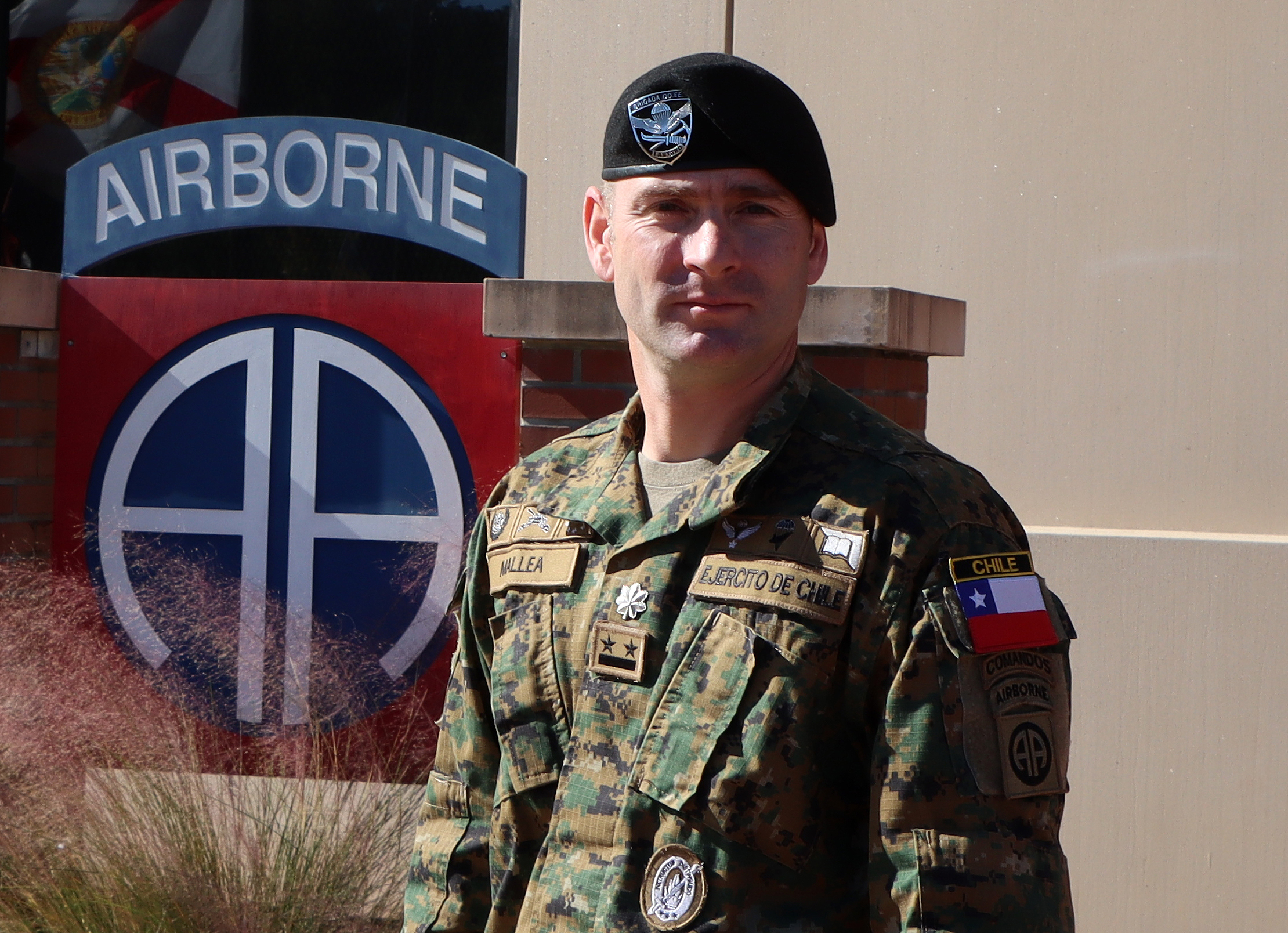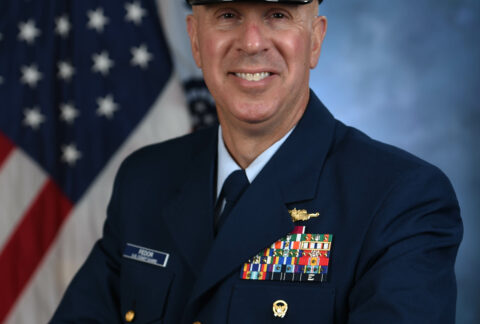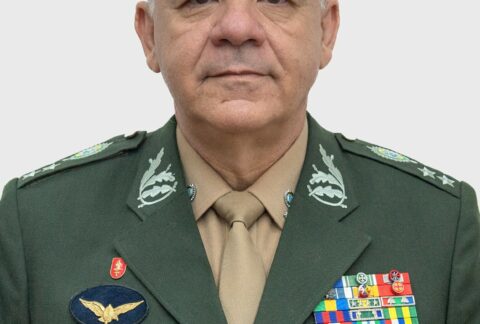The U.S. Army’s 82nd Airborne and Special Operations Forces, located in Fort Bragg, North Carolina, is where for the past 16 years, the Chilean Army has been participating in an exchange program, sending an officer to work and train with the fabled airborne division.
Currently serving a two-year billet in the Future Operations directorate of the 82nd, Lieutenant Colonel Alberto Mallea is the eighth Chilean officer to occupy the position with his rotation ending in December. Before coming to the 82nd, Lt. Col. Mallea commanded his airborne battalion for the Chilean Army following a three-year course at the Army War College in Santiago. Joining Lt. Col. Mallea in the exchange program are partner nation officers from Brazil, Canada, Germany, Holland, and the United Kingdom. Lt. Col. Mallea’s U.S. counterpart is an officer with the 82nd Airborne currently serving as a foreign instructor at the Chilean Army War College.
Throughout his 24-year career in the Army, Lt. Col. Mallea has served in several parts of the world in peacekeeping operations. He is also no stranger to the United States, where he took the Maneuver Captain’s Career Course at Fort Benning for seven months, attended a leadership seminar at Fort Leavenworth, and led a nine-member squad from the Chilean Armed Forces that took part in the Sandhurst Competition at West Point.
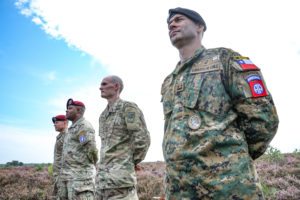
As he prepares to return to Chile where he’ll report to the headquarters of the Special Operations brigade, Lt. Col. Mallea spoke with Diálogo and reflected on his time in Fort Bragg and about what he hopes to implement at his next post.
Diálogo: You come from a military family where both your father and brother served in the Chilean Air Force (FACh), but you joined the Army? Why was that?
Chilean Army Lieutenant Colonel Alberto Mallea: Ever since I was a little kid, I liked the commandos so when I told my dad I wanted to be one, he said you need to join the Army, so I did.
Diálogo: How did your prior experience prepare you for this role with the 82nd and do you feel you achieved the goals you set out?
Lt. Col. Mallea: This was an opportunity that I couldn’t pass up. My experience not only commanding an airborne battalion, but also being a jumpmaster, along with my completion at the war college as well as my firm grasp of the English language, prepared me for the job. With regards to my goals, I think I have been able to fulfill them. The first one was trying to contribute as much as possible to the task at hand that the 82nd has. Carrying out all the planning and coordination of all their exercises and activities by bringing a different perspective and doctrinal approach from my country. The next was to acquire these learned experiences to take them later back to my country and implement them in some of the activities that we carry out. And lastly, to strengthen the ties of cooperation and friendship between the Chilean Army and the United States. This program has been going on for a long time — I’m the eighth officer in a two-year rotation — so that’s 16 years now and counting. Chile has an airborne battalion that is part of a Special Operations brigade, so it’s also an important experience to be able to bring back to the country.
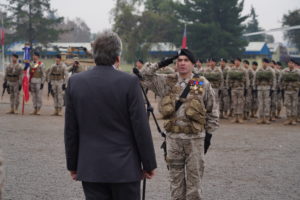
Diálogo: You currently work in the G-35 Future Operations at the 82nd. Can you talk about your typical daily routine and what are some of the lessons learned that you would you like to implement back at your next command in Chile?
Lt. Col. Mallea: My job is to help manage, support, and certify all the training for the 82nd so that they can rapidly deploy for any scenario, whether by land, water, air, or even cyber. Normally I’m here by 5:30 a.m. and log on to my computer to get updated on anything before heading out to do PT [physical training] from 6:30 to 8 a.m. I’m back in the office by 9 where I then get to work, attending several meetings, working with people from different sections and brigades which allows me to gain a deep degree of knowledge of the organization, which is quite important when evaluating what experience I can bring back to Chile.
One of the characteristics of the 82nd is its high degree of operational readiness that allows it to be able to be deployed anywhere on very short notice. And for us, all the experiences related to that are very important because they allow us to enhance our deployment capabilities in Chile, especially considering that recently the entire world has been greatly affected by natural disasters. We have had many earthquakes and some fires, and the Chilean Army is a tool that our country must be able to rapidly deploy to the aid of our countrymen. To bring back that experience from the 82nd and their rapid deployment and their readiness training is something we can use to enhance what we have, which works very well, but there are always ways we can improve.
Diálogo: Working with the 82nd, you have access to some of the newest technologies and innovations for the warfighter. Can you talk about that?
Lt. Col. Mallea: Well, that’s another of the great opportunities that one has being in a unit like the 82nd, which has a high level of operational readiness. They’re able to be deployed at any time and because of that, they dedicate an important part of their effort to testing new technologies and seeing how they could be applied tomorrow. In that sense, I have been able to work with different elements, with UAV’s [unmanned aerial vehicles] as well as artificial intelligence, which allow a much faster amount of data to be processed to speed up decision-making processes. One such technology is a visor integrated into the soldier’s helmet with a computer and OLED [organic light-emitting diode] display that provides various information, from digital maps and troop locations to distance measurements.
Diálogo: This is an exchange program. The variety of partner officers working in the division provide different perspectives for planning operations allowing all sides to learn from each other. What benefits does Chile gain from this program?
Lt. Col. Mallea: It has a great benefit because it allows for strengthening ties. It allows interoperability and allows you to share experiences and work with people from other countries. We learn from each other, and we can each offer our unique perspective on how to achieve a solution.
Diálogo: As your time with the 82nd ends, what are some of your fondest memories working with the men and women here?
Lt. Col. Mallea: The most important thing, I believe, is the camaraderie, the friends that I have made — personal and professional — this is going to be part of the most important memories that I am going to take with me. Having the experience in planning training exercises and see them carried out to fruition.
Chile has an airborne battalion, but we don’t have an airborne brigade. To have the opportunity to participate in an exercise that involves 4,000 troops in exercises of this magnitude is quite rewarding, and to see them as they are born from an idea and are gradually realized through meetings and a lot of work, until they are executed effectively and what one visualized comes into effect. I think that is a tremendous joy and something that I take with great affection back to Chile.
Diálogo: You’ve completed numerous jumps with the 82nd throughout your time here, but you have one last jump coming up in Alaska?
Lt. Col. Mallea: I’ve had the opportunity to participate in many jumps, in several airborne operations with the various units. With me being a jumpmaster and participating in these exercises, I’ve been able to award the Wings of Chile pin to the soldiers, which for us is a great sense of pride that we’re able to spread the culture of the Chilean paratrooper internationally. Every time I’ve carried out a jump with others involved in the exercise, I’ve had the honor of handing out this pin. And yes, I do have one last jump. I’ve been invited to go and participate in an airborne exercise in Alaska in December [2021], so it is a tremendous opportunity to get to know Alaska and to be able to share with those soldiers who train in such a difficult and inhospitable terrain as Alaska. I’m very much looking forward to it.

